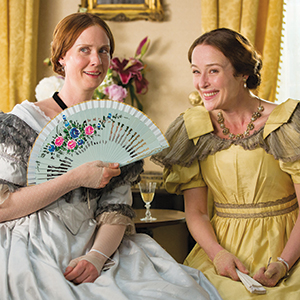Tropic Sprockets / A Quiet Passion
By Ian Brockway
Emily Dickinson (1830-1866) is one of America’s finest poets. She is known as much for her eccentric and uncompromising personality as she is for her poems, which are as sharp and as pointed as a laser. In life, she resembled a strange and fickle ivory plant, at once open to all things, only to fold in upon herself, without warning, icy with goose-pimples, pricking to the touch.
In Terrence Davies’ film, “A Quiet Passion” Dickinson is re-born with an almost supernatural intensity in accents of beauty and horror. A young and very pretty Emily (Emma Bell) writes in secret, privately at odds with her father Edward (Keith Carradine), and his stern Protestant doctrine. Edward tries in vain to get his darling Emily to church but she is having none of it. She prefers to spend her time sharing atheistic conversations with her sister Vinnie (Jennifer Ehle) much to Mr. Dickinson’s dismay. She continues to write.
One day, the family poses for a portrait. Emily, Vinnie and their dashing brother Austin (Duncan Duff) become very slowly older by time lapse. The effect is chilling, eerie and masterful.
An older Emily (Cynthia Nixon) loses her brother through marriage and her father expires. Bereft, Emily closes herself up like a bruised flower. She takes to wearing white dresses, speaking to others only through her bedroom door. Her once full cheeks are now bone-pale. She becomes as much a part of her room as the wall or the table that she writes upon.
This film is wonderfully idiosyncratic and perfectly fits Dickinson, her person and her verses. One gets healthy portions of poetry spoken in voiceover, which surrealistically resembles the spaced-out qualities of the musician Laurie Anderson.
Both Bell and Nixon are spectacular and completely embody the poet’s solitary rebellion. Periodically both actors portray Emily as outwardly compliant, but secretly combative against organized religion and social mores. At times, the film makes for difficult viewing. In one scene, the poet is gripped in a paroxysm of absolute horror, her eyes and mouth wide with terror as her body is wrenched by rolling spasms. It feels nothing less than a possession. In this case, the devil is known as Bright’s disease and that is frightening enough.
The setting of this film is as important as its narrative. The camera frequently revolves showing flowers in a still life. Emily is part of the tableau, existentially frozen, yet impelled to write. Her hands are the valves of a furnace. Though a recluse, Emily has the mind of a detached temptress. She develops an attachment via poetry with Charles Wadsworth (Eric Loren) a married minister. She is prostrate with sadness when Wadsworth leaves Amherst.
Nixon’s Emily is nothing less than a monk, a servant to poetry and it feels almost unbearably accurate, intense and sensitive This is a tour de force for Davies and Nixon who suggest the full breadth of the poet, all within the confines of Emily’s domestic garden.
With this odd, all-engrossing and visceral film, “A Quiet Passion”, Dickinson’s retiring but restless spirit can still itself in satisfaction.
Write Ian at [email protected]
[livemarket market_name="KONK Life LiveMarket" limit=3 category=“” show_signup=0 show_more=0]








No Comment